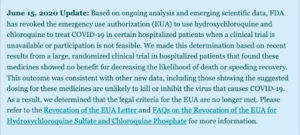An Ivy League professor and epidemiologist is accusing government agencies of suppressing alternative treatments for COVID-19, and endangering American lives in the process.
Dr. Harvey Risch, professor emeritus of epidemiology and senior research scientist at the Yale School of Public Health, argues the Food and Drug Administration and Centers for Disease Control should be held liable for “hundreds of thousands, if not millions of deaths” for their “suppression of hydroxychloroquine” as a treatment for COVID-19.
“That was the crux of the whole pandemic – that this pandemic was not used to protect the health of the population, it was used to sell vaccines and patented medications at [a] tremendous, tremendous profit to the pharma industry with the collusion of the FDA and the CDC,” Risch said last week on Blaze TV’s Steve Deace Show.
“And this is the nature of what we have been fighting for the last two-and-a-half years – not the virus per se, but our corrupted response to the virus.”
Risch noted the FDA and CDC “stubbornly refused” to view outpatient COVID-19 treatments differently from those used for hospitalized patients, who were almost certainly suffering from much later stages of the disease – stages where hydroxychloroquine (HCQ) had already been shown to be ineffective.
Despite Risch and many others’ best efforts to explain that the mechanism by which HCQ fights the virus requires its admission within the first five to seven days after symptoms appear, the public health establishment dismissed the off-label treatment as fraught with safety issues.
President Trump was famously criticized for touting HCQ as a promising treatment early in the pandemic. Critics say major media eagerly amplified negative reporting on the drug while ignoring evidence of its effectiveness, setting the stage for later demonization of the Nobel Prize-winning drug Ivermectin.
Social media companies followed suit, censoring posts regarding HCQ unless they were critical of the drug.
Peer-reviewed data was not immune to censorship on social media platforms, either. Clinical data from other nations was derided as “misinformation,” and those who sought to report on the studies were banned from major social media platforms.

In June of 2020, the FDA revoked the Emergency Use Authorization (EUA) granted to HCQ with the “Update” provided here.
Risch argues the “large, randomized clinical trial in hospitalized patients” cited was specifically crafted to administer HCQ only after its window of efficacy had passed.
According to former Baylor University Chief of Medicine Dr. Peter McCullough, the alleged manipulation of the study’s parameters is traceable to National Institute of Allergy and Infectious Disease head Dr. Anthony Fauci.
McCullough asserts the manipulation was an attempt to justify suppressing further research into HCQ or similarly acting drugs in favor of pursuing mRNA vaccines exclusively.
It’s this dynamic Risch is referring to when he describes the motives for pandemic policy as profit-driven, an opinion increasingly shared among both clinicians and researchers.
Several months later, after HCQ had been effectively banished from the prescription pads of the nation’s physicians, a new drug appeared with a remarkable record of efficacy under early administration.
Ivermectin, like HCQ, was a decades-old drug with a lengthy safety record, but long past its period of patent protection. Consequently, physicians argue its widespread use to combat COVID-19 might have forestalled the need for either vaccines or later patented drugs such as Paxlovid, Molnupiravir. When a drug is past patent protection, the maker makes little to no profit on its sale and use.
It’s this monetary motive Nebraska Attorney General Doug Peterson cites as the reason for its original patent holder, Merck, actively discouraging the off-label use of Ivermectin against COVID.
In his 48-page legal opinion regarding the right of Nebraska physicians to prescribe drugs for off-label use, Peterson argues Merck has a major conflict of interest where Ivermectin is concerned, as it was set to release its own patented treatment, Molnupiravir, just weeks later.
Were Ivermectin publicly shown to be effective against COVID-19, Merck’s multibillion-dollar windfall from the sale of Molnupiravir to governments around the world would have arguably evaporated, as would have the billions generated by new vaccines.
As the months and years advance from those first, confusing days of the pandemic, Risch and other epidemiologists maintain the behavior of public health agencies and organizations increasingly appears error-filled, and in many instances, potentially corrupt.

